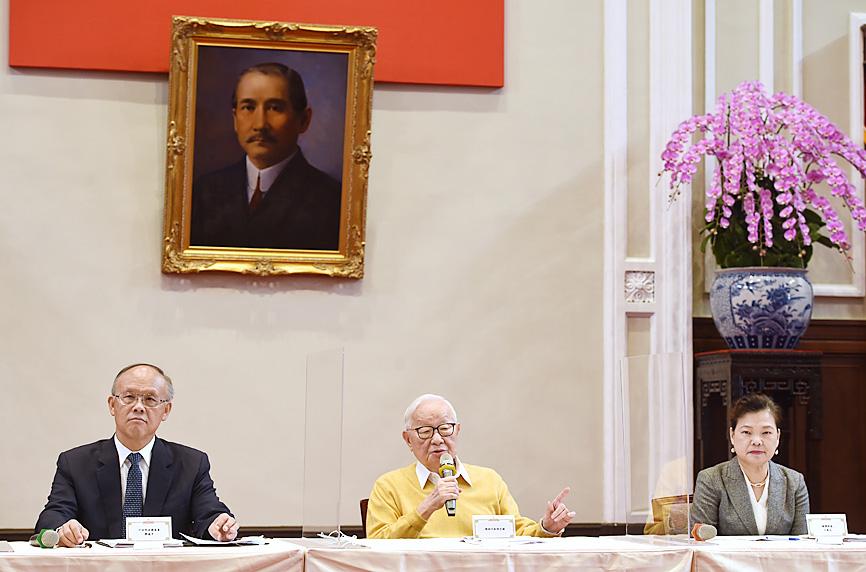President Tsai Ing-wen’s (蔡英文) envoy to the APEC forum, Taiwan Semiconductor Manufacturing Co (台積電) founder Morris Chang (張忠謀), is seeking support from other member countries for Taiwan’s bid to join the 11-nation Comprehensive and Progressive Agreement for Trans-Pacific Partnership (CPTPP).
On Friday, during the online APEC economic leaders’ summit hosted by New Zealand, Chang said that economic integration has helped the region forge closer economic and trade ties.
He said in a speech that he has faith in supporting initiatives that deepen economic integration, promote high standards on trade-related rules and help improve the livelihoods of people across the Asia-Pacific region.

Photo: Liu Hsin-de, Taipei Times
“Because of these beliefs, we have applied to join the CPTPP, a comprehensive agreement that could generate momentum for the development of the region — liberalizing trade and investment, while promoting sustainable growth,” he said.
“Chinese Taipei plays an irreplaceable role in the global high-tech supply chain. We also have a highly transparent market economy, and are able and willing to respect the CPTPP’s high standards,” he added.
Taiwan applied to join the CPTPP in September, just days after China filed its application. It applied under the name “the Separate Customs Territory of Taiwan, Penghu, Kinmen and Matsu.”
Chang spoke about Taiwan’s willingness to join the CPTPP after Tsai told him to use the occasion to seek support from APEC members.
In a news conference in Taipei yesterday, Chang said the Chinese representatives to the summit did not offer an olive branch to Taiwan.
Taiwan is well-positioned to join the CPTPP, but it could face some hurdles, Chang said, adding that he had faith that Taiwan still has a good chance of securing admission to the trade bloc.
US President Joe Biden did not comment on Taiwan’s bid to join the CPTPP, he said.
In his speech to the APEC summit, Chang touted free trade as being crucial to meeting national security needs.
“While shortage of any critical component is a serious problem, free market, which includes free trade and free competition, is still the best solution,” Chang said.
However, free trade seems to carry more conditions and qualifications than it used to, Chang said.
“We believe most of those conditions and qualifications are counter-productive,” he said.
He described the current semiconductor shortage as “a culmination of original underestimate of demand, natural disaster, logistic jam and digital demand spike.”
Chang added that Taiwan has been willing to share its experience in containing COVID-19 with other APEC members.
Taiwan joined APEC as a full member under the name Chinese Taipei in 1991. It is the fifth time that Chang has attended an APEC forum as Tsai’s envoy.
Although Taiwan is an APEC member, its presidents are prohibited from attending the summit due to China’s opposition, so an envoy is sent in their place.

CHAOS: Iranians took to the streets playing celebratory music after reports of Khamenei’s death on Saturday, while mourners also gathered in Tehran yesterday Iranian Supreme Leader Ayatollah Ali Khamenei was killed in a major attack on Iran launched by Israel and the US, throwing the future of the Islamic republic into doubt and raising the risk of regional instability. Iranian state television and the state-run IRNA news agency announced the 86-year-old’s death early yesterday. US President Donald Trump said it gave Iranians their “greatest chance” to “take back” their country. The announcements came after a joint US and Israeli aerial bombardment that targeted Iranian military and governmental sites. Trump said the “heavy and pinpoint bombing” would continue through the week or as long

TRUST: The KMT said it respected the US’ timing and considerations, and hoped it would continue to honor its commitments to helping Taiwan bolster its defenses and deterrence US President Donald Trump is delaying a multibillion-dollar arms sale to Taiwan to ensure his visit to Beijing is successful, a New York Times report said. The weapons sales package has stalled in the US Department of State, the report said, citing US officials it did not identify. The White House has told agencies not to push forward ahead of Trump’s meeting with Chinese President Xi Jinping (習近平), it said. The two last month held a phone call to discuss trade and geopolitical flashpoints ahead of the summit. Xi raised the Taiwan issue and urged the US to handle arms sales to

BIG SPENDERS: Foreign investors bought the most Taiwan equities since 2005, signaling confidence that an AI boom would continue to benefit chipmakers Taiwan Semiconductor Manufacturing Co’s (TSMC, 台積電) market capitalization swelled to US$2 trillion for the first time following a 4.25 percent rally in its American depositary receipts (ADR) overnight, putting the world’s biggest contract chipmaker sixth on the list of the world’s biggest companies by market capitalization, just behind Amazon.com Inc. The site CompaniesMarketcap.com ranked TSMC ahead of Saudi Aramco and Meta Platforms Inc. The Taiwanese company’s ADRs on Tuesday surged to US$385.75 on the New York Stock Exchange, as strong demand for artificial intelligence (AI) applications led to chip supply constraints and boost revenue growth to record-breaking levels. Each TSMC ADR represents

Pro-democracy media tycoon Jimmy Lai’s (黎智英) fraud conviction and prison sentence were yesterday overturned by a Hong Kong court, in a surprise legal decision that comes soon after Lai was jailed for 20 years on a separate national security charge. Judges Jeremy Poon (潘兆初), Anthea Pang (彭寶琴) and Derek Pang (彭偉昌) said in the judgement that they allowed the appeal from Lai, and another defendant in the case, to proceed, as a lower court judge had “erred.” “The Court of Appeal gave them leave to appeal against their conviction, allowed their appeals, quashed the convictions and set aside the sentences,” the judges